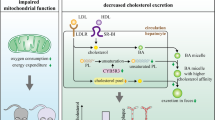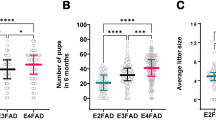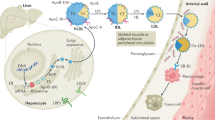Abstract
The APOA5 and APOE genes play an important role in determination of plasma levels of triglycerides (TG) and total cholesterol (TC). We have analyzed APOA5 (T-1131>C and Ser19>Trp) and APOE (e2/e3/e4) variants in 2500 representatively selected Caucasians (1168 men, 1332 women). In female subjects (but not in male) an association between APOE polymorphism and TC was observed on the background of the common APOA5 haplotype (TT-1131/SerSer19) – APOE2 carriers have the lowest (5.12 (1.15) mmol/l) and the APOE4 carriers have the highest (6.05 (1.06) mmol/l) levels of plasma TC (P<0.001). If at least one APOA5 C-1131 or Trp19 allele was present, APOE exhibits no significant effect on plasma TC. APOA5 did not affect plasma TG levels, if APOE4 allele was present. In the presence of APOE2 or APOE3, carriers of the APOA5 alleles, C-1131 and/or Trp19, have higher TG levels (1.64 (1.05) mmol/l) than others (1.37 (0.75) mmol/l) (P<0.01). In male subjects, the same, but non-significant trend was observed.
In female subjects, we have detected an interaction between APOE and APOA5 variants and plasma lipid levels.
Similar content being viewed by others
Log in or create a free account to read this content
Gain free access to this article, as well as selected content from this journal and more on nature.com
or
References
Vinereanu D : Risk factors for atherosclerotic disease: present and future. Herz 2006; 31 (Suppl 3): 5–24.
Eichler JE, Dunn ST, Perveen G, Thompson DM, Stewart KE, Strouhla BC : Apolipoprotein E polymorphism and cardiovascular disease: a HuGE review. Am J Epidemiol 2002; 155: 487–495.
Fruchart-Najib J, Bauge E, Niculescu LS et al: Mechanism of triglyceride lowering in mice expressing human apolipoprotein A5. Biochem Biophys Res Commun 2004; 319: 397–404.
Pennacchio LA, Olivier M, Hubacek JA et al: An apolipoprotein influencing triglycerides in humans and mice revealed by comparative sequencing. Science 2001; 294: 169–173.
Hubacek JA : Apolipoprotein A5 and triglyceridemia. Focus on the effects of the common variants. Clin Chem Lab Med 2005; 43: 897–902.
Miller SA, Dykes DD, Polesky HF : A simple salting out procedure for DNA extraction from human nucleated cells. Nucleic Acid Res 1988; 16: 1215.
Hixson JE, Vernier DT : Restriction isotyping of human apolipoprotein E by gene amplification and cleavage with HhaI. J Lipid Res 1990; 31: 545–548.
Hubáček JA, Škodová Z, Adámková V, Lánská V, Poledne R : The influence of APOAV polymorphisms (T-1131>C and S19>W) on plasma triglyceride levels and risk of myocardial infarction. Clin Genet 2004; 65: 126–130.
Gerdes LU, Klausen IC, Sihn I, Faergeman O : Apolipoprotein E polymorphism in a Danish population compared to findings in 45 other study population around the world. Genet Epidemiol 1992; 9: 155–167.
Peng DQ, Zhao SP, Nie S, Li J : Gene–gene interaction of PPARgamma and ApoE affects coronary heart disease risk. Int J Cardiol 2003; 92: 257–263.
Sorli JV, Corella D, Frances F et al: The effect of the APOE polymorphism on HDL-C concentrations depends on the cholesterol ester transfer protein gene variation in a Southern European population. Clin Chim Acta 2006; 366: 196–203.
Schaefer JR, Sattler AM, Hackler B et al: Hyperlipidemia in patients with apolipoprotein E 2/2 phenotype: apolipoprotein A5 S19W as a cofactor. Clin Chem 2004; 50: 2214.
Hubacek JA, Horinek A, Skodova Z et al: Hypertriglyceridemia – interaction between apoE and apoAV variants. Clin Chem 2005; 51: 1311–1313.
Acknowledgements
This study is supported by research Grant 1M0510 (Ministry of Education, Youth and Sports of the Czech Republic).
Author information
Authors and Affiliations
Corresponding author
Rights and permissions
About this article
Cite this article
Hubacek, J., Lánská, V., Škodová, Z. et al. Sex-specific interaction between APOE and APOA5 variants and determination of plasma lipid levels. Eur J Hum Genet 16, 135–138 (2008). https://doi.org/10.1038/sj.ejhg.5201941
Received:
Revised:
Accepted:
Published:
Issue date:
DOI: https://doi.org/10.1038/sj.ejhg.5201941
Keywords
This article is cited by
-
Genetic contributions to attentional response time slopes across repeated trials
BMC Neuroscience (2015)
-
APOE −491 T allele may reduce the risk of atherosclerotic lesions among middle-aged women
Molecular and Cellular Biochemistry (2012)
-
Apolipoprotein A5-1131T>C polymorphism, but not APOE genotypes, increases susceptibility for dyslipidemia in children and adolescents
Molecular Biology Reports (2011)
-
Additive effects of LPL, APOA5 and APOEvariant combinations on triglyceride levels and hypertriglyceridemia: results of the ICARIA genetic sub-study
BMC Medical Genetics (2010)



